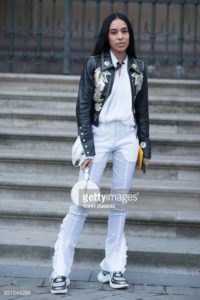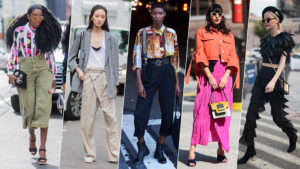Fashion week season, which lasted all over the world, has just concluded. The four major fashion weeks were held in the four fashion capitals: London, Milan, Paris, and New York. New York fashion week was the most crowded one despite that in Paris being the earliest and most coveted event of the year. I love the fashion and passion that fashion insiders and media outlets bring to our living rooms. While most people are always looking forward to seeing fashion celebrity attendees and new brands of clothes, I am most intrigued by the marketing communication concepts and strategies that the brands come up with to make the shows memorable.

Traditionally, the fashion shows have taken a catwalk formation in which tall quintessential girls are strutting back and forward to represent the designs ranging from dresses, bags, shoes, and accessories. Milan and New York fashion weeks were the most memorable since their organizers have learned the art of alluding to their consumers base. Just last year, Alibaba the Chinese E-commerce collaborated with New York fashion week to connect international brands with Chinese consumers (Marketing Staff Writers, 2017). The brands have taken personal responsibility to ensure that they remain at the fore in producing over the top shows.
Brands continue to use traditional marketing and advertising forms such as billboards, television adverts, and print advertisements. However, as the technology continues to become more digital, more and more brands are coming up with smart alternatives to ensure the tech-savvy millennial consumers get their hands on their merchandise. Mobile marketing has been at the forefront in efficiently activating digital marketing in
Fashion Week. Marketers of AccuWeather have extended their reach to New York Fashion week to help the attendees to be on the lookout what weather to expect on the days of the show. Steve Smith, the CEO of AccuWeather, says that this initiative was as a result of increasing their mobile platform to draw designers, editors, and general consumers to their digital platform as a way to reap from mobile-centric activations (Bohannon, n.d.).
consumers to their digital platform as a way to reap from mobile-centric activations (Bohannon, n.d.).
Digital marketing has changed the value bestowed on Fashion week and how fashion brands reach their audience. More brands have moved from the traditional fashion week calendar and marketing strategies geared towards selling season apparel. Digital marketing and the use of technology has seen most of the big names in the fashion industry collaborate with other firms to produce noteworthy performances for their attendees (Goldston, 2018). The fusion of tech and fashion has encouraged the growth of smaller brands, giving them a chance to be part of the big boys club. With a low budget, a new entrant can use a digital presentation to increase its global footprint. A digital display gives the designer a chance to work with their limited budget and resources to introduce Fashion week attendees to a glimpse into their growing brand (Ozuem & Azemi, 2017). Bloggers and vloggers share and post the content to social media, giving other consumers back at home a chance to buy into the brands marketing efforts.
 Unlike before where fashion weeks were reserved for the elite, brands have discovered the power of digital marketing through media influencers. In shows, the long-established media outlets are let into the magic, but nowadays, bloggers, vloggers, and other media influences have been given a front seat for the action as well. Social media has brought down the walls of fashion week, and it is only imperative for brands to come up with sustainable marketing tools to ensure that they get value for money.
Unlike before where fashion weeks were reserved for the elite, brands have discovered the power of digital marketing through media influencers. In shows, the long-established media outlets are let into the magic, but nowadays, bloggers, vloggers, and other media influences have been given a front seat for the action as well. Social media has brought down the walls of fashion week, and it is only imperative for brands to come up with sustainable marketing tools to ensure that they get value for money.
The new digital marketing has aided brands to come up with collections that are on season immediately. Although digital marketing marks an evolving market structure, it has also been said to create a lot of challenges for major fashion brands such as Vera Wang, a major Player in NYFW (Goldston, 2018). Digital marketing has increased face to face marketing allowing designers of fashion weeks to communicate directly with the press and buyers.
Although the use of technology has improved the marketing strategies and goals of the fashion brands, it has also caused an uproar. The New York Times recently carried the headline “How Smartphones are killing off the fashion show” (Friedman, 2016). Social media and digital marketing strategies have exposed the fashion week to a wild crowd that cannot wait to discover and replicate the designs. As we debate over the importance of the trickling effect of digital marketing in the fashion world, it is important to note that digital marketing holds a lot of power right now. The revolution started with online marketing, and with time, more and more  concepts will revolutionize how we consume goods and services. Fashion is one of the industries that have gone through a 360-degree change, and as we go through marketing communication, it is not beyond us to understand that it is here to stay. What do digital marketing tools you think are going to transform our economy? Will they improve or disrupt the industry?
concepts will revolutionize how we consume goods and services. Fashion is one of the industries that have gone through a 360-degree change, and as we go through marketing communication, it is not beyond us to understand that it is here to stay. What do digital marketing tools you think are going to transform our economy? Will they improve or disrupt the industry?
References:
Bohannon, C. (N.d.). Mobile marketing struts through New York Fashion Week. Mobilemarketer.com. Retrieved from https://www.mobilemarketer.com/ex/mobilemarketer/cms/news/strategy/18640.html
Friedman, V. (2016, February 2016). How smartphones are killing off the fashion show. Nytimes.com. Retrieved from https://www.nytimes.com/2016/02/11/fashion/new-york-fashion-week-smartphones-killing-off-runway-show.html?_r=0
Goldston, N. (2018). New York fashion week is changing, and this is why it matters in The marketing landscape. Forbes.com. Retrieved from https://www.forbes.com/sites/njgoldston/2018/02/22/new-york-fashion-week-is-changing-and-this-is-why-it-matters-in-the-marketing-landscape/#11400e2a41ec
Marketing Staff Writers. (2017). Alibaba partners with New York Fashion Week. Marketing Interactive. Retrieved from http://www.marketing-interactive.com/alibaba-partners-with-new-york-fashion-week/
Ozuem, W., & Azemi, Y. (Eds.). (2017). Digital marketing strategies for fashion and luxury brands (1st ed.). Hershey, PA: IGI Global.

4 Responses to How Digital Marketing Has Changed Fashion Week